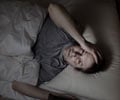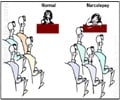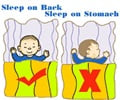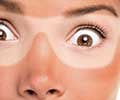- Sleep Disorders - (http://www.nlm.nih.gov/medlineplus/sleepdisorders.html)
- Coren, Stanley. Sleep Thieves: An Eye-Opening Exploration into the Science and Mysteries of Sleep. New York: The Free Press; 1996, p. 287.
About
A disorder of the sleep patterns of a person is known as sleep disorder.
Sleep is the blissful state that rejuvenates our mind and body everyday and any deprivation often leads to a disorder that can affect our health. Sleep deprivation is prevalent among 25% of the population and it leads to reduced cognitive abilities, tiredness, lack of energy, and weakness of muscles.

Research indicates that women are twice more likely than men to suffer from sleep disorders.
The most common types of sleep disorders include-
- Insomnia
- Hypersomnia
- Sleep apnea
- Restless leg syndrome (RLS)
- Narcolepsy
- Parasomnias
- Circadian rhythm disorders
Sleep disorders can be diagnosed on the basis of patient’s explanation about the condition and tests such as multiple sleep latency test and polysomnography.
Treatment options are available for most sleep disorders. Sleep disorder clinics help people restore normal sleeping patterns through various techniques. Sometimes just having regular sleep habits can help an individual.
Prognosis for various sleep disorders depends on the stage at which the therapy has been initiated and the compliance of the patient.
"In my opinion sleep is a habit acquired by the environment. Like all habits it is generally carried to extremes. The man that sleeps four hours soundly is better off than a dreamy sleeper of eight hours."-Thomas Edison.
 MEDINDIA
MEDINDIA
 Email
Email














Sleep disorders are commonly seen problem in many people. And it happens due to irregular routine, changes in work shift etc. But don’t worry you can able to get rid of from all kinds of sleep issues with the help of Waklert and Nuvigil. Nuvigilshop provides you this wakefulness promoting agent. In case if you suffer from excessive sleepiness or narcolepsy, shift work sleep disorder then go with this medicines. These are recommended by doctor to have active day.